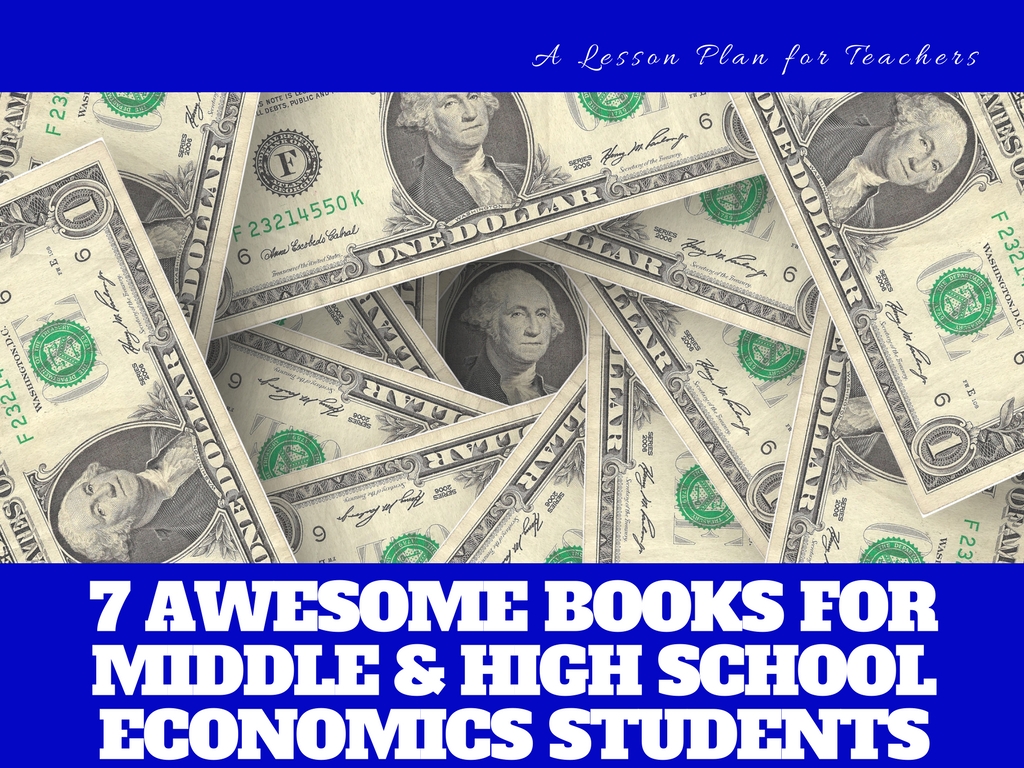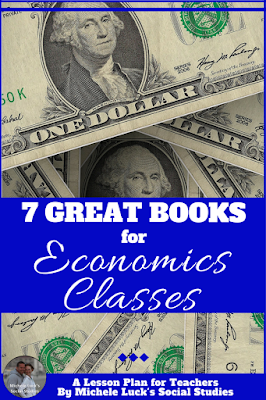Teaching Economics in middle school and high school builds a strong foundation for government and civics studies, but also prepares your students for critical life lessons. Economics is a worldwide issue – every culture, every country, and every person is influenced by their economic situation and the economics occurring in the society around them. Encouraging economic study in your social studies lesson plans, using CCSS and common core standards, will allow your students to develop proficiency in an area that will be beneficial both within their history career and in their personal lives. You can use dull economic textbooks and additional reading to teach economic content, or you can use these 7 great books for teaching middle and high school Economics, which are sure to relay the important content to your students, but also to spark a further interest in economic study which will further your students’ education.

Help your middle and high school students to study up on government and economics with drab, regurgitated textbook material, or inspire a strong foundation in economic knowledge by encouraging your students to delve further into the world of economics. Use these 7 awesome books for middle and high school Economics students to provide an alternative and exciting study in economics. With these 7 great economics books, your students will develop an academic foundation in world government and economics, but also in personal economics, which will benefit them significantly in their adult lives.
7 Awesome Books for Middle and High School Economics Students
1. The Cartoon Introduction to Economics: Volume One: Microeconomics – One of two volumes, The Cartoon Introduction to Economics: Volume One: Microeconomics by Yoram Bauman, Ph.D., presents a hysterical take on Microeconomics. Perhaps the most brilliant take on teaching Economics, Bauman discusses price theory, individual vs. group outcomes, strategic interactions, market interactions, elasticity, and more.
BONUS! Also pick up The Cartoon Introduction to Economics: Volume Two: Macroeconomics to round off the study. Volume Two includes topics such as unemployment, recession, inflation, and more macro study.
2. The Amazon Way: 14 Leadership Principles Behind the World’s Most Disruptive Company – John Rossman transports readers into the mind of Jeff Bezos as he established the world’s largest Internet retailer, discussing Amazon’s third-party seller program, enterprise services, revolution of Internet industry, and transformation from book retailer to primary online retailer for all things purchasable.
BONUS! Explore the World’s Most Innovative Companies of 2017 and read about how Amazon tops the list.
3. How to be The Startup Hero: A Guide and Textbook for Entrepreneurs and Aspiring Entrepreneurs – The Startup Hero, by Tim Draper, serves as a revolutionary guide for aspiring entrepreneurs, addressing the struggles they will encounter and offering tips for embarking on the entrepreneurial road. This book will demonstrate the many layers of entrepreneurship and economy to your students.
4. Freakonomics: A Rogue Economist Explores the Hidden Side of Everything – By Steven D. Levitt, Freakonomics is a popular yet unexpected take on economics, asking all of the “right” questions that you’d never expect to hear from an Economist. An entertaining method to educating the general public on economics, Levitt dives into economic theory with a humorous approach.
BONUS! Radio link! Have students choose a Freakonomics Radio Archive episode, study it, and then present it to the class. Tie it into topics learned from the Freakonomics book.
5. The Everything Economics Book: From theory to practice, your complete guide to understanding economics today – The Everything Economics Book by David Mayer and Melanie Fox breaks down complicated economic knowledge and makes it easier to understand, presenting topics like trade, market intervention, unemployment, inflation, supply and demand, foreign exchange markets, and economy measurement.
6. The Armchair Economist: Economics and Everyday Life – Steven Landsburg studies economic questions with a practical twist, exploring off beat topic like the safety of seatbelts, celebrity endorsements, oil spills, workplace safety, and more.
BONUS! Play The Island Game from the Center for Economic Conversion.
7. Economics Through Everyday Life: From China and Chili Dogs to Marx and Marijuana – Economics Through Everyday Life, by Anthony Clark, is considered a primer to economics for aspiring Economists. In a slow-paced introduction, Clark explores markets, taxes, inequality, jobs, business cycles, recessions, and more. Clark even includes true stories to provide a relative approach to economic study.
SUPER BONUS! Download Where Do Goods Come From? Interactive Resource – it’s a FREEBIE!!! Use this resource to help instill the knowledge learned in these 7 awesome reads.

Most people think money, finances, and economics are boring, everyday topics that individuals are forced to learn but never enjoy. Those people are likely using academic textbooks to “learn” economics, but the only thing they’re likely to retain is a resentment for how boring the topic is. These 7 great books for teaching middle and high school economics are sure to encourage your students to embrace the study of economics and not only retain, but enjoy, the knowledge! There are so many entertaining economics games and interactive lesson plans, and coupling them with these 7 great books for economic classes are sure to inspire your students to an economic wealth of knowledge!
Happy Teaching!
